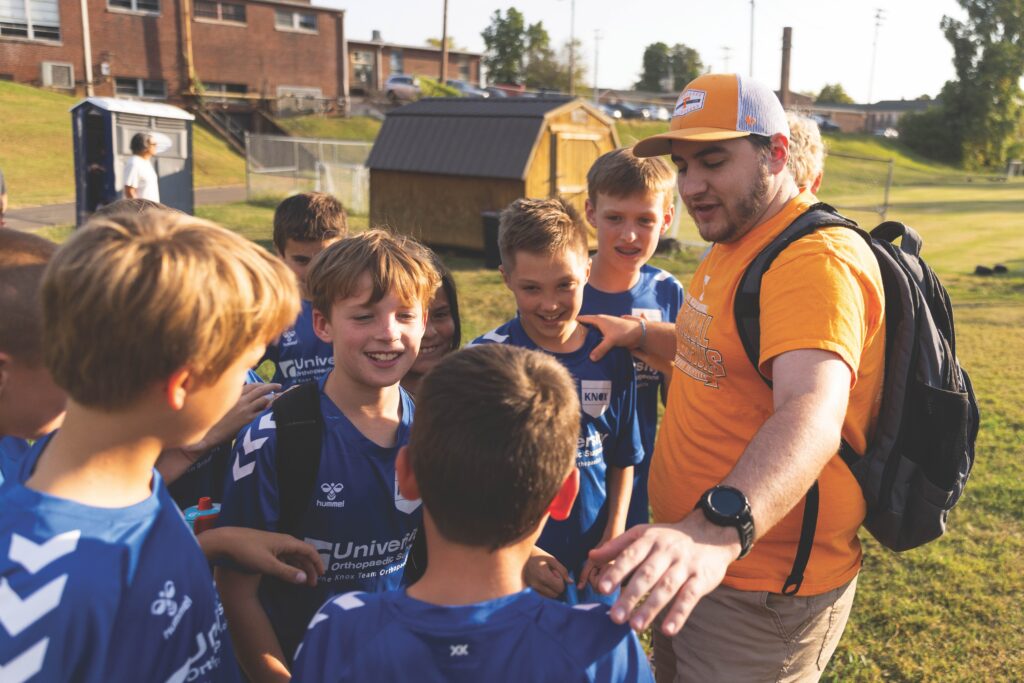The referee’s final whistle rings out across the pitch. The match is over. A single-file line of high-fives and a chorus of “good game” precedes the aftermath—as one team celebrates, a somber silence falls over the other as cleats are unlaced and gear is packed away.
At practice and in games, youth athletes are expected to perform. A thrilling victory can bring unparalleled joy and confidence, instilling lasting memories of triumph and teamwork. But a stinging defeat can lead to disappointment and self-doubt, challenging players’ resilience on and off the field.
A partnership between the Kinesiology, Recreation, and Sport Studies graduate program and the youth soccer program at One Knox SC, Knoxville’s professional soccer club, is looking to change the game by incorporating mental health coaching into weekly practices to help young players navigate the highs and lows of play.
“In our field of sport psychology and motor behavior, there aren’t many programs in the US that have a hands-on opportunity like this with a professional soccer organization,” says Scott Barnicle, an associate professor of practice in the College of Education, Health, and Human Sciences, who helped establish the partnership. “It’s unique for our students to work with One Knox as part of their training.”

A graduate student with UT’s Kinesiology, Recreation, and Sport Studies program works with a group from One Knox SC’s youth soccer program. Photo by Breven Walker
The partnership began in spring 2023 after Barnicle was approached by a fellow faculty member. Soon after, he recruited student Nicole Rogers (’23) to help pilot the program.
“Working with those kids affirmed what I wanted to do,” says Rogers, who now coaches youth athletes through her own sport psychology consulting business. “I’m extremely grateful for my experience with the partnership, and I’m so glad more kids are learning about these techniques as the program has grown.”
The partnership has expanded since Rogers coached that first team, with 12 teams now receiving mental performance coaching each week as part of their practices. Plans are in place for nine more teams to join the roster next season.
At the practices, graduate students use interactive activities to teach their teams mental strategies like goal setting and emotional regulation. Natalie Plaut, a second-year KRSS student, feels the information she’s sharing is changing how the players on her team see sports—and one another.
“Getting to work with kids reminds me of my roots playing softball—it’s hard to be a teammate and learn those lessons of perseverance,” says Plaut. “We’ve had parents thank us and share how their kids have been impacted by what we’re doing.”
Abbie Richeson, a fellow second-year student who played soccer for 14 years, echoes Plaut.
“Teaching kids these skills at a young age will help them overcome struggles when they move up to more competitive levels,” says Richeson.
“I’m impacting young athletes in a way that I wish I had been impacted, and I’m excited to be learning what does and doesn’t work for me as I look to my future career,” Richeson says.
The students aren’t the only ones seeing the impact. To One Knox Executive Director Sam Weisbrod and Associate Director of Coaching Victoria Weinhandl, the mental strategies players are learning each week have helped them and their families find confidence and self-assurance.
“There is so much that wasn’t addressed or thought about when I was growing up playing,” says Weinhandl. “How we handle ourselves on the field coincides with how we handle ourselves in the classroom or with friends. I’ve seen kids grow more confident, and I’ve even seen parents learn from it through their kids.”
“For us, it’s really meaningful to have the students and the university partnering with us,” adds Weisbrod. “The game is just a game, but we’re here for so much more than that. To have a positive impact like this in our community is magic.”
—
Photos by Breven Walker

